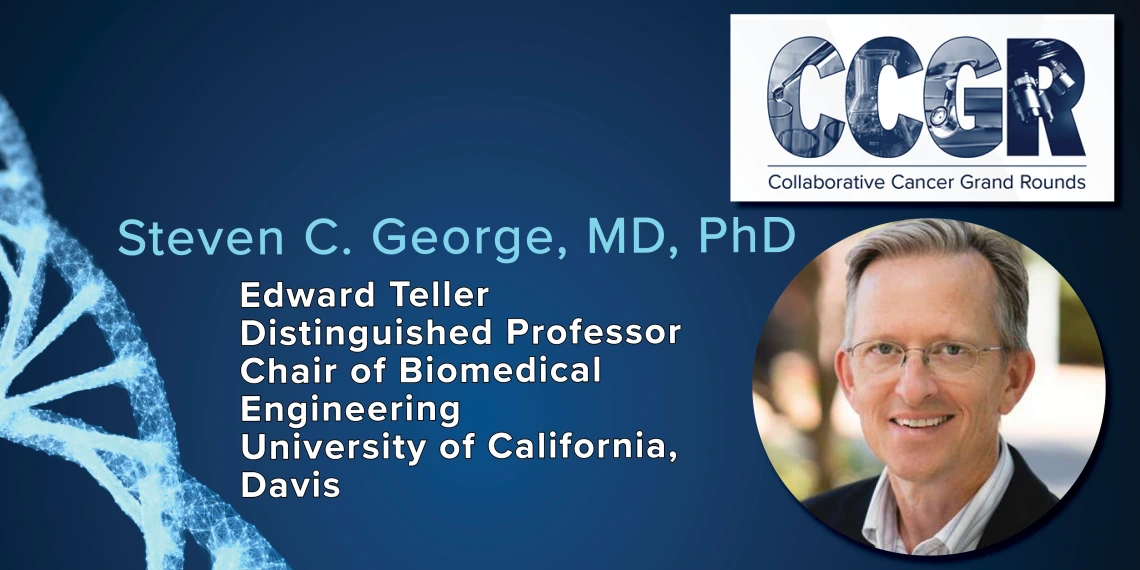Collaborative Cancer Ground Rounds: Steven C. George MD, PhD

Steven George, MD, PhD, the Edward Teller Distinguished Professor and Chair in Biomedical Engineering at the University of California, Davis, will lead a discussion titled “Microphysiological Systems to Probe Immune Cell and Extracellular Vesicle Trafficking” at the next Collaborative Cancer Grand Rounds, noon to 1 p.m., March 15, at the Kiewit Auditorium, Cancer Center’s Sydney E. Salmon Building.
Jennifer Barton, PhD, who recommended Dr. George to lead this CCGR, said that he is an outstanding mentor who has lead training grants and has decades of experience in biomedical engineering, particularly in biomaterials and microfluidics for cancer applications.
“Dr. George is an expert in developing ‘organs on a chip,’ and using these devices to understand cancer development and treatment,” said Barton, who is the director of the UArizona BIO5 Institute, the Thomas R. Brown Distinguished Chair in Bioengineering, and a professor in biomedical engineering, electrical and computer engineering, optical sciences and biosystems engineering. “To create organs on a chip his lab must have interdisciplinary expertise, including in stem cells, microfluidics hardware, imaging and computation. The advantages of these complex devices are that the in vivo environment can be better recapitulated, and that interventions––e.g. growth factors or therapeutic drugs––can be introduced and the response visualized.”
According to a feature on George in the UCDavis Biomedical Engineering, he received his bachelor’s degree in chemical engineering from Northwestern University, his MD from the University of Missouri School of Medicine and Ph.D. from the University of Washington (Seattle) in chemical engineering. He was at the University of California, Irvine for 19 years where his research interests included pulmonary gas exchange, lung mechanics, vascularizing engineered tissues, and microphysiological systems.
UCI, he served as the William J. Link professor and founding chair of the Department of Biomedical Engineering, the director of the Edwards Lifesciences Center for Advanced Cardiovascular Technology and the founding principal investigator on a T32 predoctoral training grant from the National Heart Lung and Blood Institute.
In 2014, George moved to Washington University in St. Louis where he served as the Elvera and William Stuckenberg Professor and Chair of the Department of Biomedical Engineering until 2017. He was elected a fellow in the American Institute of Medical and Biological Engineering (AIMBE) in 2007 and has published more than 110 peer-reviewed manuscripts.
His work is currently funded by grants from the NIH that focus on creating tissue engineered models of the cardiac, pancreas, and cancer microenvironments using induced pluripotent stem cell and microfabrication technology.
“I hope Dr. George talks about how he chooses the level of complexity of his microfluidic systems––in other words, what elements of the in vivo environment are most important, and how they are incorporated into the device,” Barton said. “Also, I am interested in what type of imaging he uses to visualize the structure and functionality of the modeled organ.”
Barton said the CCGR should enhance education on how organs on a chip can be used in cancer research and inspire collaborations between cancer biologists, therapeutic developers, and engineers at UArizona.
For more information, contact Ann Bridges, abridges1@arizona.edu.
Join via Zoom, Password: CCGR



